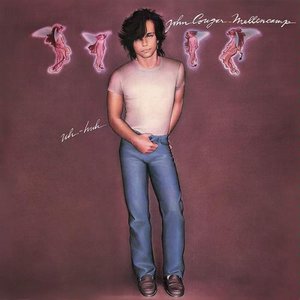
Uh-Huh (1983)

1. Crumblin' Down
2. Pink Houses
3. The Authority Song
4. Warmer Place
5. Jackie O
6. Play Guitar
7. Serious Business
8. Lovin' Mother For Ya
9. Golden Gates
Coming off the commercial juggernaut that was American Fool, John Mellencamp had every reason to double down on the formula that made him a star. Instead, with 1983’s Uh-Huh, he leaned into something sharper, leaner, and far more personal. It was a deliberate pivot—not just musically, but in identity. For the first time, Mellencamp insisted on using his full name, albeit hyphenated with the still-contractual “Cougar,” signaling a step toward reclaiming authorship of both his music and his image.
Uh-Huh plays like a rebuttal to excess. Where many of his contemporaries embraced the polished bombast of mid-'80s rock, Mellencamp scaled things back. The arrangements are tighter, the production more organic, and the songwriting more pointed. The lead single, Crumblin’ Down, sets the tone immediately—a raw, chugging anthem of frustration delivered with minimal pretense. Even the music video, shot on a bare soundstage with only a chair as a prop, stands in stark contrast to the era’s overproduced visuals. It was a clear message: Mellencamp wasn’t interested in theatrics. He was here to tell stories.
And the stories are good ones. Pink Houses, arguably the album’s centerpiece, masks its social commentary in an irresistible chorus, quietly delivering one of Mellencamp’s earliest and most effective political statements. Elsewhere, The Authority Song taps into his now-familiar anti-establishment streak, while Play Guitar embraces rock cliché with just enough self-awareness to keep it engaging. Golden Gates closes the album with surprising grace—a sparse, haunting portrait of disillusionment that hints at the more somber songwriting he would explore later in the decade.
The album does stumble, but only briefly. Jackie O feels more like an unfinished demo than a fully realized track. Built around what sounds like a canned rhythm from a home organ, it’s the lone misfire on an otherwise consistent set. At just 33 minutes, Uh-Huh doesn’t have much room for filler, and this outlier stands out more than it otherwise might.
Still, the misstep is minor. The rest of the album is tight, cohesive, and unmistakably his. Uh-Huh didn’t quite match American Fool in commercial terms, but artistically, it may be the more important record. It proved that Mellencamp wasn’t just a product of industry design or radio luck—he was a serious songwriter with something to say, and the instincts to say it well.
In hindsight, this was the real beginning of his golden era. American Fool made him famous. Uh-Huh made him credible.
Go back to the main page
Go To Next Review